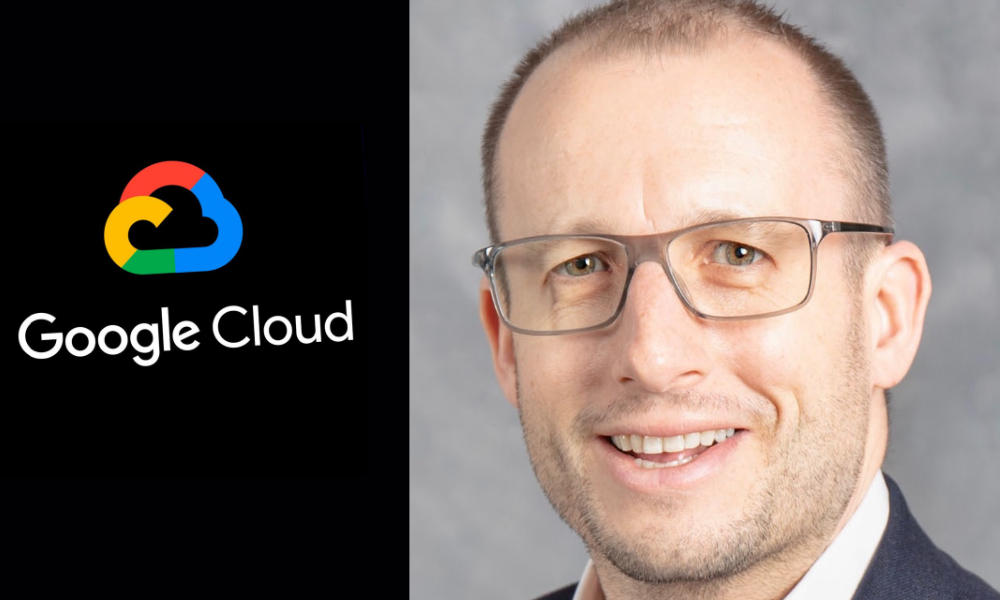Splitting his role between his native UK and New York, Nigel Walsh is as much at home behind the microphone and camera, as he is leading Google Cloud’s insurance efforts. One of the industry’s best-known figures due to his upbeat social media presence and his work as a presenter and writer, Walsh holds a position on the advisory board of Capital G, one of Google’s investment arms.
He also orchestrates and defines the strategy for all teams, ensuring a seamless connection between the challenges faced by insurers and the solutions Google Cloud provides.
Why is insurance a big deal for Google Cloud? How does it integrate into the overall insurance model?
Insurance providers are at the forefront of digital transformation, and Google Cloud has seen the sector’s potential for disruption for years – creating personal experiences for its customers, allowing insurers to better manage and assess their risk, capture additional market share, and expand into new markets.
My role at Google Cloud is to drive the company’s efforts in insurance, ensuring providers are leveraging the best technology to increase efficiencies and drive innovation. I also play a crucial role in linking our efforts to both our Marketplace or Independent Software Vendor (ISV) industry solution partners and our Global System Integrator (GSI) partners. Industry or marketplace partners include entities such as Federato, Cape Analytics, Unqork, Five Sigma and Tensorflight. These partners focus specifically on addressing insurance-related challenges, such as claims, underwriting, and policy issues, all built on Google Cloud and accessible through our marketplace for convenient consumption.
Additionally, we collaborate with GSI partners like Accenture, BCG, Capgemini, Deloitte, Quantiphi, and many others renowned for their robust insurance practices. This collaboration aims to seamlessly introduce these solutions to our clients. In essence, I bring all these elements together to enhance our engagement and impact in the insurance sector.
You have an impressive career trajectory. Could you share the story of how and why you ventured into the insurance industry?
Admittedly, like many others in this industry, I sort of stumbled into it, a narrative we’re actively trying to change. The Canadian Insurance Society, among others, is working to alter the perception around this. As my former co-host on the InsurTech Insider, Sarah Kocianski, pointed out in Forbes, with self-driving cars and drones, why isn’t the insurance industry considered cool?
I fell into it, but I consider myself incredibly fortunate. I get to engage with some of the most cutting-edge technology globally while addressing a real societal need. My personal mission is well-known – to make insurance lovable. After all, nothing in society moves without insurance as its foundation.
Why wouldn’t you want to start at the very core? When we articulate its significance and showcase the exciting initiatives underway, people start to view it as a dynamic industry. I recently attended a careers fair for my son’s school focused on financial services, featuring insurance companies, banks, and financial institutions. Interestingly, there was a queue at the Google table with attendees expressing excitement about Google’s involvement in insurance. This experience demonstrates how we can generate interest and enthusiasm for companies like Google supporting significant players in the financial industry.

You mentioned the InsurTech Insider podcast opened doors to broadcasting and writing. Could you share with us the most memorable person you’ve had the opportunity to interview on the show?
While I won’t pick a favourite guest, (it’s akin to picking a favourite child) one of the memorable episodes for me was an annual tradition where we highlighted the quirkiest quotes or claims of the year. Collaborating with Oliver Ralph from the FT, we shared amusing insurance claims submitted over the years, adding a touch of humour to each Christmas break. There really are some whacky claims you just couldn’t make up!
The podcast’s five-year journey covered nearly every major player in today’s insurtech landscape, and even some that have moved on. We featured a diverse range of insurtechs, from CoverGenius and Flock to Inand, Daniel at Lemonade, Snap Sheet, and Zego. Each guest brought a unique perspective, addressing different challenges and showcasing passion for distinct aspects of the industry.
For instance, Flock started with drone insurance, a topic close to my tech enthusiast heart, as evidenced by the drone tucked away in one of these boxes. They’ve since transitioned to commercial insurance. Lemonade emerged with the ambition to revolutionise insurance perceptions, and I believe they’ve succeeded in that endeavour. Cover Genius pioneered early embedded insurance
We also had the privilege of hosting major carriers like Aviva, even conducting a live session at the Aviva Garage in Shoreditch, fostering collaboration between traditional incumbents and InsurTechs and generating excitement in a unique format. Special acknowledgment goes to David Brear and the 11FS team for injecting enthusiasm into insurance, mirroring their success in Fintech.

Nigel Walsh, Head of Global Insurance, Google Cloud
When it comes to drawing stories out of people during interviews, do you find yourself more passionate about startups, or does the allure of big corporations also captivate you?
I’ve been deeply involved in the startup space for quite a number of years. Interestingly, my passion lies more in the individuals who understand the “why.” First-time founders often embark on a venture, encounter challenges, pivot, and persevere.
Flock provides an excellent example of this. They initiated one idea, formed a remarkable team with Ed and Anton, and then recognised the need for their business to adapt and evolve. I find the human element of these stories fascinating—the willingness to learn, pivot, and move at a pace often unmatched by traditional organisations.
Tobi and Laka’s journey with cycle insurance is another illustration. Starting as a B2C model, they’ve transitioned into a partnership model, showcasing the dynamic evolution of these companies. None of these ventures is an overnight success; they involve long hours, hard work, and dedication over 5, 6, or 7 years to truly make a significant impact in the world of insurance. For me, it’s not about the size of the company but the people within them.
Interestingly, you find the same spirit within large organisations when given the opportunity to innovate. The landscape of innovation has shifted in the past couple of years. Initially, there were innovation hubs within major players like Aviva and AXA. However, in the last 12 to 24 months, post-COVID, many of these central teams have transformed into business line entities.
Now we see claims innovation teams, underwriting innovation teams, pricing innovation teams, reflecting an evolution in how innovation is applied. I’ve enjoyed witnessing the transformation of each organisation, understanding how they adapt to the changing landscape while staying true to what was right for them at the time.
Moving on to your industry books, the latest of which delves into AI. What are your sentiments regarding AI, especially generative AI?
Many, including myself, often fear change, and the mindset we bring to these developments is pivotal. Someone once reminded me that with 1.25 billion drivers on the road, most individuals view their cars as a means to get from point A to B or accomplish a task. Similarly, this holds true for any emerging technology; there’s always initial scepticism.
People expressed concerns when transitioning from horses and carts to cars. Regarding AI, especially generative AI, my optimism is boundless concerning its impact on our industry.
Going back to your earlier question about why insurance matters to Google Cloud, insurance is fundamentally built on data. If you trace it back to its roots, it starts with data, then people, and much more. Reflecting on the early days of Lloyd’s Coffee House, it was essentially people sharing information.
Google Cloud’s focus on data positions us, insurers, and participants to engage in this process on an immense scale. Insurers have been leveraging AI for numerous years—collaborating on risks, understanding submissions, adjudicating claims, redefining pricing strategies, and more.
Generative AI, the T being Transformer from Google’s original paper in 2017, ‘Attention is all you need’. What’s truly remarkable is that it has become a top-down initiative, with every boardroom engaging in conversations about generative AI at a pace and scale unprecedented in my career.

What are your predictions for AI this year?
Unlike previous transformative technologies like blockchain, generative AI has rapidly become accessible to everyone. Tools such as ChatGPT or Gemini have been widely tried by individuals, including school students, ensuring that the next generation is already familiar with this technology. Even my 70-something-year-old mother is curious about it due to its regular feature in daily news.
It’s genuinely ubiquitous and widespread. Now, we’re in the process of understanding how it can be applied swiftly within insurance organisations. I’m genuinely optimistic about its current applications and equally excited about the depth it will reach in 2024.
Just six months ago, people were asking, “What is it?” Three months ago, they were exploring potential use cases, and today they’re overwhelmed with the multitude of use cases, figuring out how to prioritise them. The rapid acceptance and understanding within insurance organisations, both large and small, are truly exhilarating.
You come from the forefront of technology at Google, and the insurance industry is often labelled as slow in terms of innovation. Given your position, do you concur with this assessment?
In short, no. The insurance industry, from my perspective, showcases phenomenal pockets of excellence. Having been on the side of reports during previous roles at Deloitte and Capgemini, where discussions revolved around what happens when Google or other major tech players enter the insurance arena or how to innovate like Google, it’s crucial to recognise that we are fundamentally different organisations. When operating within the realms of financial services, dealing with regulated products that involve lives at risk, we need to adhere to very clear regulations and guardrails.
Is the industry slow? As I mentioned, there are pockets of excellence across various domains, often driven by innovation centres and labs. Over the years, these innovation labs have evolved from experimental stages and proof of concepts into initiatives aiming to scale and bring innovation to the entire organisation. Is the industry slow to experiment? Absolutely not.
People have always explored proof of concepts and more. However, scaling these initiatives across the entire organisation poses a significant challenge, involving not just technology but also cultural shifts, mindsets, and regulatory considerations.
From Google Cloud’s perspective, what are the major challenges faced by insurers, and what solutions is Google Cloud offering to address these challenges?
The primary challenge, as previously mentioned, revolves around data. Additionally, there’s a significant issue with technical debt, common to many large insurance companies. Whether it’s dealing with mainframes, managing numerous applications, or dispersed data, transitioning from a product-centric to a customer-centric approach is a major challenge. Google Cloud addresses these challenges through an array of capabilities, ranging from core storage and compute to specialised tools such as Document AI, Contact Center AI, solutions for fraud detection and anomalies, visual AI, Earth Engine, and more.
Integration is facilitated through tools like Anthos and Apigee. When collaborating with an insurance company, the focus is on problem-solving rather than just showcasing capabilities. For instance, addressing challenges related to the speed of processing submissions, transforming a process that takes four to six weeks into a matter of minutes. Similarly, on the claims side, initiatives include improving customer updates through chatbots and Contact Center AI, ensuring efficient communication tailored to the customer’s channel of choice.
Digital transformation often brings challenges related to company culture and driving innovation, necessitating changes in strategies and processes.
How does Google Cloud approach changing the mindset and culture of a company to foster innovation and encourage people to step out of their comfort zones?
Google’s approach involves sharing insights into how Google operates and allowing organisations to select and apply the elements that best suit their context. While there is no one-size-fits-all solution, Google Cloud’s consulting and technology teams work with organisations to identify the most relevant components. This may involve migrating mainframes, modernising contact centres, or leveraging expertise in video technology. Google shares its experiences, showcasing the work environment and culture, enabling organisations to pick and choose elements that align with their goals.
Visits to Google campuses in New York, London, or California offer a firsthand look at how Google operates, empowering organisations to adapt these practices to their own contexts. Google Cloud also collaborates with other Alphabet entities, such as Google X, Maps, and CapitalG, providing a broader understanding of how different parts of Alphabet function and encouraging cross-collaboration to bring the best of Google to diverse organisations.
What inspires you in the insurtech landscape?
What inspires me? I find the direct-to-customer (D2C) space particularly challenging and intriguing. There are some players making remarkable progress in this area, and their continued advancements are noteworthy.
Personally, I’ve always been enthusiastic about the role of enterprise software enablers operating in the middle ground. This aligns well with my mission at Google, where we empower marketplace partners to connect the dots, accelerating processes to deliver better outcomes for brokers or customers.
The focus on compressing the time-to-value for traditional carriers and InsurTechs in this middle segment is where I see exciting developments. Notable examples include Five Sigma’s innovations in the claims space, our partnership with Guidewire, and Federato’s noteworthy initiatives. Collaborations with data providers like Cape Analytics, Unqork, Tensor Flight, and Dun & Bradstreet contribute to creating a cohesive ecosystem that simplifies processes for these life organisations leveraging Google Cloud. We are creating one hell of an insurance marketplace for InsurTechs and carriers to seamlessly interact and remove the burden of integration.
Join Google leaders in London, at Insurtech Insights Europe, 2024
Engage with Google experts at Insurtech Insights Europe, 2024, at the InterContinental London – The 02 on March 20-21. James Lord, Client Partner UK Insurance, and Linda Brown, GEN AI Specialist, will delve into the realm of delivering generative AI-powered experiences swiftly, efficiently, and responsibly with Google’s cutting-edge technology and models, including Gemini.
Through their presentation titled “Operational Productivity vs. Industry Transformation: Where to Begin?” attendees will gain insights into building transformative AI experiences quickly and confidently. The discussion will explore whether to prioritise major transformation or refine existing business processes, offering demo examples and key considerations to guide decision-making.
Interview by Joanna England

Joanna England is an award-winning journalist and the Editor-in-Chief for Insurtech Insights. She has worked for 25 years in both the consumer and business space, and also spent 15 years in the Middle East, on national newspapers as well as leading events and lifestyle publications. Prior to Insurtech Insights, Joanna was the Editor-in-Chief for Fintech Magazine and Insurtech Digital. She was also listed by MPVR as one of the Top 30 journalist in Fintech and Insurtech in 2023.









